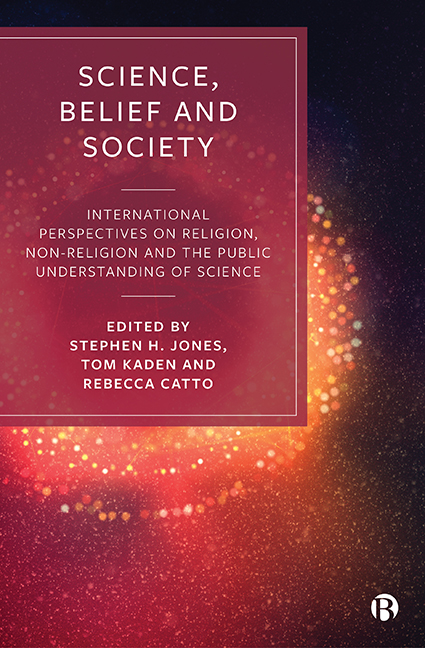 Science, Belief and Society
Science, Belief and Society Book contents
- Frontmatter
- Contents
- List of Figures and Tables
- Notes on Contributors
- Editors’ Acknowledgement
- Foreword
- Editors’ Introduction: Science, Belief and the Sociological Tradition
- PART I Methodological Challenges in the Study of Science and Belief
- PART II Belief in the Study of Science and Technology
- PART III Science, Culture and Non-religion
- PART IV Religion, Conflict and Moderation
- Conclusion: Future Directions in the Sociological Study of Science and Belief
- Index
5 - From ‘Science and Religion’ to ‘Transcendence in Science’, or: What We Can Learn from the (History of) Science and Technology Studies
Published online by Cambridge University Press: 27 April 2022
- Frontmatter
- Contents
- List of Figures and Tables
- Notes on Contributors
- Editors’ Acknowledgement
- Foreword
- Editors’ Introduction: Science, Belief and the Sociological Tradition
- PART I Methodological Challenges in the Study of Science and Belief
- PART II Belief in the Study of Science and Technology
- PART III Science, Culture and Non-religion
- PART IV Religion, Conflict and Moderation
- Conclusion: Future Directions in the Sociological Study of Science and Belief
- Index
Summary
Introduction
There is a problem in debates on science and religion: when talking about ‘science’, on the one hand, and ‘religion’, on the other, willing or not, one constructs and reconstructs two distinct categories. This is true independent of any positionings towards models of conflict, independence, dialogue, integration (see Barbour, 1997) or nonoverlapping magisteria (see Gould, 2011 [1999]), or any other description of this relationship. Simply upon using those categories, we explicitly or implicitly assume that we already know what ‘science’ means and how it is different from what is not science in general, and different from religion in particular.
This is not to say that there are no such differences. However, both spheres – science and religion – are not as clear-cut and uncontested as the use of such categories might imply. Indeed, we can observe intense and ongoing debates in both sub-disciplines dealing with those categories: the sociology of religion and the sociology of science (or science and technology studies [STS]).
Debates on science and religion seem to be blind, or at least not very attentive, to those ongoing debates. In the case of the sociology of religion, there are a number of authors who doubt that it is even possible to give a definition of what ‘religion’ is. Others criticize its usage for normative reasons because this term would seem to reproduce dominant power relations between the so-called Western and Eastern worlds (Dubuisson, 2007; Fitzgerald, 2010). In the case of STS, the field was, indeed, founded to call into question the boundary between science and non-science. Thus, while authors in the specialized sociological sub-disciplines put all their effort into deconstructing and criticizing the categories of science and religion, those same categories are often dealt with as given and uncontested when it comes to the dichotomy of science and religion.
This volume, from different angles, seeks to enrich the debate by also questioning the categories. Within this framework, this chapter focuses on one side of this dichotomy, namely, the science side. The underlying question that I address is to what extent ‘doing science’ might have similarities with ‘doing religion’. With this perspective, I look beyond the categories and turn the relationship between science and religion into an empirical – instead of a theoretical or even ideological – question.
- Type
- Chapter
- Information
- Science, Belief and SocietyInternational Perspectives on Religion, Non-Religion and the Public Understanding of Science, pp. 103 - 126Publisher: Bristol University PressPrint publication year: 2019


